Lochhead on Marketing
113 Are you Crazy or Mission Driven? Musing on Play Bigger’s 5th Anniversary
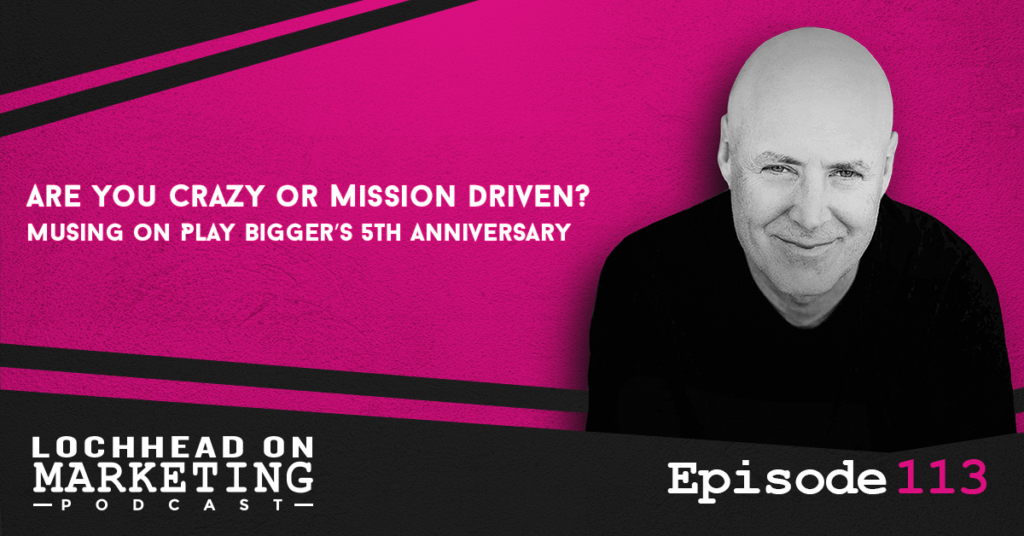
Podcast (lochheadonmarketing): Play in new window | Download (Duration: 14:21 — 9.8MB) | Embed
Subscribe: Apple Podcasts | Spotify | RSS | More
Welcome to this very special episode of Lochhead on Marketing, on what is the week of Play Bigger, my first book’s fifth anniversary of publication.
Recently on Follow Your Different, we had on Captain Paul Watson, who is the co-founder of Greenpeace and the founder of Sea Shepherd. Sufficed to say, Captain Paul is vey mission driven. Some would call him a saint, while others call him an eco-terrorist. What I could tell you for sure is that Captain Paul, like almost every other legendary person, is “kind of crazy”.
We also want to share with you something that Churchill famously said, and that is to “Never give up on something you can’t go a day without thinking about”. Now, what Churchill didn’t say is what you should do if the thing that you can’t stop thinking about makes you batshit crazy.
Even worse, what do you do if the thing that you can’t stop thinking about isn’t really something that you think about? It’s something that thinks you that is to say, it owns you.
So in this episode of Lochhead on Marketing, the fifth anniversary of Play Bigger coming out, let’s talk about the difference between being passionate and possessed and what that means.
What Comes After Thinking It
Churchill once said,
“Never give up on something you can’t go a day without thinking about.”
What he didn’t say is what you should do if that thing drives you nuts. Is this thing that’s driving you nuts? The difference between choosing a passion and being possessed? Now that you’re thinking about it, what if you really can’t stop thinking about it all the time?
In the end, all you could do is embrace it and call it your own. What happens after that? What happens if when you share it with people eight out of 10 times, they think you’re nuts or you fail? Now imagine if that something causes you to fail 8 times out of 10 for 30 years, then what do you do?
It’s daunting, right? So what if I tell you that this is a big part of my story?
For me, my something was Category Design. This week is actually the 5th anniversary of my book Play Bigger, which introduced Category Design to the world. What I have rarely talked about is the fact that Play Bigger was my last-ditch effort to try to make category design land. It was my last effort to try to make it have value and impact at any kind of scale for entrepreneurs, for creators, for innovators of any kind.
I figured it would fail. I didn’t want it to fail, but I figured it would be because 30 years of a two hundred batting average would kind of give that to you. Well, it turns out Play Bigger didn’t fail. If you read it or shared it, I want to thank you very much, because your efforts put Play Bigger into the top one percent of books in the business book category.
There is No Cheat to Success
I wish I could tell you that having a legendary product will automatically lead it to success. It doesn’t. This was also the case when I talked about Category Design before. Entrepreneurs and other business leaders would either misinterpret it as just another marketing or watered-down messaging, which is actually one of my least favorite words in marketing.
What also irked me is when Hustle Porn Stars sell you the idea of how to be successful instantly. You just need to follow X, Y, and Z to achieve your goals.
Based on experience, it never is as easy as that. Take it from someone who fell for it and have learned his lesson the hard way.
“There is no shortcut to success. There’s no such thing as a 4-hour work week. All that stuff about hacks and hustle porn, motivational garbage is a lie, and I’m no liar.” – Christopher Lochhead
Sure, there are some people who get born rich or born beautiful and there are some people who win the lottery. But success in life is not about that. So I wanted to share with you what it really took, what it took to make Play Bigger and everything that’s come since then successful was approximately two thousand five hundred and fifty five days. That’s seven years.
Play Bigger
Wait, seven years? Didn’t you say it was the 5th anniversary just now?
You see, even though Play Bigger came out five years ago, we started work on it two years before that. Since Play Bigger came out, we’ve produced about 500 of our own podcasts, I’ve given somewhere between fifty and seventy-five speeches.
There’s a bunch of us, the authors who Play Bigger and the team that works on Follow Your Different, Lochhead on Marketing, who have done a shit ton of work making Play Bigger, Niche Down, Follow Your Different, Lochhead on Marketing and now Category Pirates successful.
We took the following 30 years in the trenches. Real seven years of hard work support from countless legendary people who contributed to the ideas, who lent their advice, their experience and encouragement, who pushed us, who fought with us, who argued with us.
To hear more From Christopher Lochhead and how to toe the line between crazy and mission driven, download and listen to this podcast.
Bio
Christopher Lochhead is a #1 Apple podcaster and #1 Amazon bestselling co-author of books: Niche Down and Play Bigger.
He has been an advisor to over 50 venture-backed startups; a former three-time Silicon Valley public company CMO and an entrepreneur.
Furthermore, he has been called “one of the best minds in marketing” by The Marketing Journal, a “Human Exclamation Point” by Fast Company, a “quasar” by NBA legend Bill Walton and “off-putting to some” by The Economist.
In addition, he served as a chief marketing officer of software juggernaut Mercury Interactive. Hewlett-Packard acquired the company in 2006, for $4.5 billion.
He also co-founded the marketing consulting firm LOCHHEAD; the founding CMO of Internet consulting firm Scient, and served as head of marketing at the CRM software firm Vantive.
Links
We hope you enjoyed this episode of Lochhead on Marketing™! Christopher loves hearing from his listeners. Feel free to email him, connect on Facebook, Twitter, Instagram, and subscribe on Apple Podcast! You may also subscribe to his newsletter, The Difference, for some amazing content.
112 Maybe The Only Career Advice That Matters
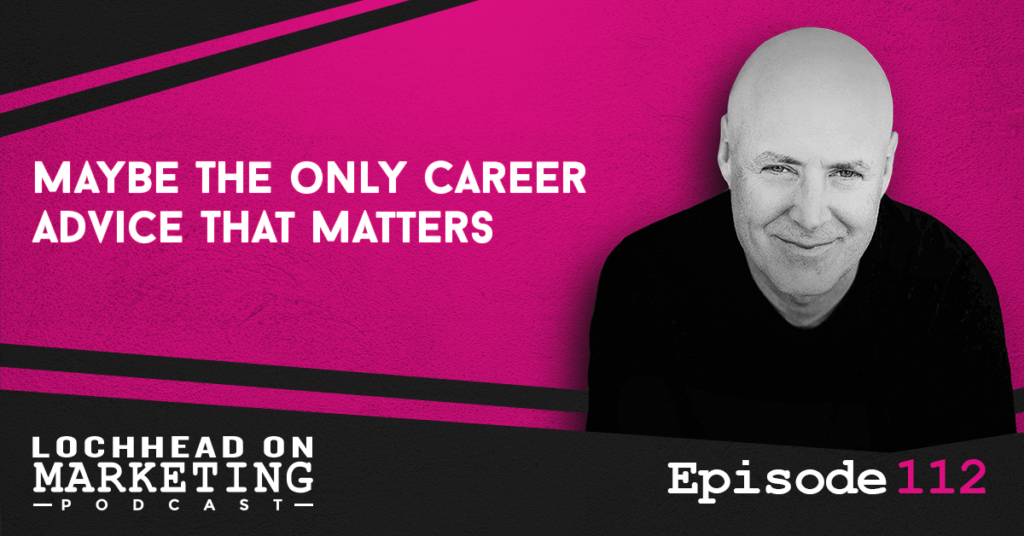
Podcast (lochheadonmarketing): Play in new window | Download (Duration: 7:16 — 5.0MB) | Embed
Subscribe: Apple Podcasts | Spotify | RSS | More
These days, we hear a non-stop barrage of career advice. Some of them is good, but a lot of them are not. In this episode of Lochhead on Marketing, let’s talk about what might be the only career advice that matters.
Relationships, Marriages, and Divorce
By now, you may have heard of Bill and Melinda Gates are getting a divorce, and that Jeff Bezos and McKenzie Scott got divorced a couple of years ago. You might be wondering why we brought this up.
You see, these people are some of the wealthiest entrepreneurs and biggest philanthropists ever. According to hustle porn stars and business advice gurus, these are the people we should aspire to be. Yet for whatever reason, their marriage didn’t work out.
While there is merit to saying that sometimes divorcing doesn’t mean it failed, but just ran its likely course, it does make you wonder.
“The reality is if your personal life isn’t working, all the money in the world can’t save you.” – Christopher Lochhead
Living a Legendary Life
Which brings us to the second point: the decision about who your significant other or partner is going to be is arguably the biggest decision that you will make.
Because when it works, it is the foundation for designing a legendary life. If it doesn’t work, everything just seems out of place.
So we should ask ourselves: are we designing our life around our work or our work around our life?
While this is not necessarily a binary decision, most people would want to live a legendary life.
“I think what most of us want is we want to have a legendary life. And whether we’re working or in our marriage, our primary relationship or with our family and friends, we want to have what you might think of as a 360-degree life.” – Christopher Lochhead
Getting Things Right
Herein lies the question: is it possible to get everything right all the time?
Of course not. Though in general, it is what most of us are trying to do. In that context, our work sits inside of our non-work life.
So if you’re somebody who’s been working too hard, work 80 to 100 hours a week and travel two to four hundred thousand miles a year on a plane, here’s a career advice. Ask yourself: what am I working for?
We’re living at a time of massive personal self-examination that has been brought on by the pandemic. We recently wrote a Category Pirates about this, how people are going YOLO, YOLO being an expression for you only live once.
Now is a time for consideration. And I think what these high-profile divorces tell us as somebody who’s been divorced myself, is that it’s time to consider our work in the context of our lives.
Links
A Very “Different” Approach To A Legendary Career: YOLO And Achieve Your Personal IPO
Bio
Christopher Lochhead is a #1 Apple podcaster and #1 Amazon bestselling co-author of books: Niche Down and Play Bigger.
He has been an advisor to over 50 venture-backed startups; a former three-time Silicon Valley public company CMO and an entrepreneur.
Furthermore, he has been called “one of the best minds in marketing” by The Marketing Journal, a “Human Exclamation Point” by Fast Company, a “quasar” by NBA legend Bill Walton and “off-putting to some” by The Economist.
In addition, he served as a chief marketing officer of software juggernaut Mercury Interactive. Hewlett-Packard acquired the company in 2006, for $4.5 billion.
He also co-founded the marketing consulting firm LOCHHEAD; the founding CMO of Internet consulting firm Scient, and served as head of marketing at the CRM software firm Vantive.
We hope you enjoyed this episode of Lochhead on Marketing™! Christopher loves hearing from his listeners. Feel free to email him, connect on Facebook, Twitter, Instagram, and subscribe on Apple Podcast! You may also subscribe to his newsletter, The Difference, for some amazing content.
111 Mike Maples, Jr. On How Legendary Entrepreneurs Create Categories
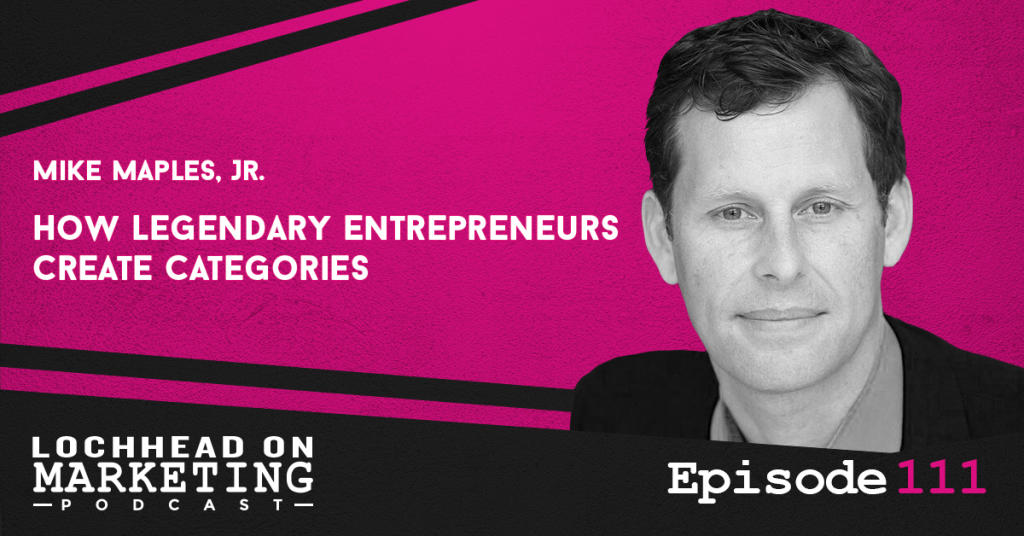
Podcast (lochheadonmarketing): Play in new window | Download (Duration: 14:30 — 10.0MB) | Embed
Subscribe: Apple Podcasts | Spotify | RSS | More
Welcome to a special episode of Lochhead of Marketing. What you’re about to hear are the thoughts of one of the smartest people in Silicon Valley on Category Design. He is the entrepreneur turned venture capitalist Mike Maples, Jr.
Mike Maples, Jr. Is the co-founder of Floodgate Capital. Floodgate has led early-stage investments in companies like Twitter, Lyft, and much more.
Recently, I had the pleasure of showing up as a guest on Mike’s podcast. Usually after the guest podcast, he does a shorter episode where he synthesizes what he thinks he has learned from the guest.
Today’s episode is just that. Listen to Mike Maples, Jr. as he shares his thoughts on category design for entrepreneurs. With that said, let’s get into it.
Being a Legendary Entrepreneur
“Why do I, as an entrepreneur, want to begin category design at the beginning? Because you want to be 80 percent of a multi-billion dollar market that you created, that you design. And that makes you almost impossible to catch.” – Christopher Lochhead
Mike starts off by quoting a quote from the episode. This quote pretty much sums up why someone aiming to be a legend should do category design right from the onset. Legendary companies are born from extraordinary startups building breakthrough products that change the future.
Though you don’t always have to start from scratch. Few entrepreneurs and businesses realize that there’s a third lever to pull on the path to greatness: creating a category to add to the confusion.
Category Design vs Branding
Mike is aware that a lot of people are still not clear as to what Category Design is. Some confuse it with branding; some marketing ploy that can help your product resonate without actually changing the product.
“Category design could be confused with getting the right marketing slogan or the right three letter acronym like CRM or ERP or some other type of message that will hopefully resonate. Or we make the mistake of believing it’s a message you use to describe your business after you’ve achieved product market fit. But it’s far more than that.” – Mike Maples, Jr.
Traditional Marketing vs Breakthrough Startup
Mike gives a brief explanation of how Traditional Marketing works. Simply put, they are more concerned on fighting for market share of their current category. Think marketing battles between Pepsi and Coke. Conventional Startups tend to think along the same lines.
Whereas Breakthrough Startups try to create new categories to dominate in, making sure that they are the Kings of the Category before anyone else grabs a share of the market.
In a world of marketing slogans blaring at you left and right, having your own category lets you avoid the need to seek attention to compete. All you have to do is to show people that your new category is worth it, and the market will do the rest.
“All of us, including your future customers, employees and any potential believers, live in a very confusing and noisy world. Your startup won’t have a chance to get people to remember much about you and why you matter. So you have to be really clear on what you want people to know about you and only you, why it matters and why they should join your cause. The way to do this is not to talk about jargon, buzz words, or what Christopher Lochhead calls why my carbondigulator is better. Category design is about avoiding the comparison game. It’s not about being the best, it’s about being the only one in the category.” – Mike Maples, jr.
To hear more from Mike Maples, Jr. and his insights on category design for entrepreneurs, download and listen to this episode.
Bio
Mike Maples, Jr. is the Co-Founder and Partner at Floodgate, the host of the Starting Greatness podcast and a Co-conspirator with awesome Startup Founders.
Links
Connect with Mike!
Twitter: @m2jr
LinkedIn: in/Maples
Podcast: Starting Greatness
Website: Floodgate
We hope you enjoyed this episode of Lochhead on Marketing™! Christopher loves hearing from his listeners. Feel free to email him, connect on Facebook, Twitter, Instagram, and subscribe on Apple Podcast! You may also subscribe to his newsletter, The Difference, for some amazing content.
110 Category Creation: How To Dam The Demand
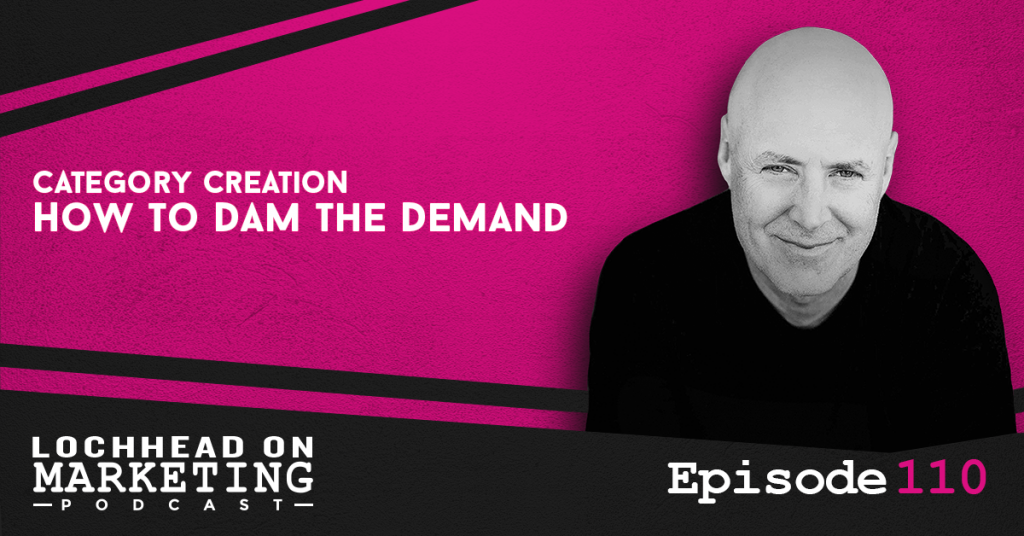
Podcast (lochheadonmarketing): Play in new window | Download (Duration: 11:42 — 8.0MB) | Embed
Subscribe: Apple Podcasts | Spotify | RSS | More
With Category Design or Category Creation strategy, we often talk about the distinction between capturing existing demand, and creating new demand.
In this episode of Lochhead on Marketing, let’s talk about an in-between strategy that category designers use as a powerful tool in creating demand. That is to dam existing demand and redirect it in their own way, like the way a dam redirects water.
Damming the Demand
Marc Benioff, found of Salesforce.com, used this approach when marketing his new category. Bear in mind that when he launched Salesforce Automation as a CRM, CRM was already an established category. What made Benioff legendary is how he redirected the CRM traffic to Salesforce.
All it took was an idea: Sure, you want CRM, but you don’t want one that’s only available on-premise. Cloud CRM is where it’s at.
By adding a modifier to CRM, he dammed the demand for the old category and redirected it to his own. He’s creating a difference that did not exist in the minds of the market. Most importantly, he creates a new choice for them.
Expanding Your Reach
Much like Salesforce, Peloton did the exact same thing and ran away with it. They offered an alternative to boutique fitness in the form of home fitness. Yet again, it’s a choice that the market did not anticipate would have a demand. Peloton harnessed that demand and redirected it to their new category.
From there, they expanded it from Spin classes to treads. Eventually, they added home classes for Yoga, Pilates, and other activities usually reserved for group boutique fitness.
The use of the term Home Fitness created a demand that wasn’t there before. It’s like creating the void yourself and filling it up with your own category creation.
Tried and Tested in Category Creation
It turns out damming demand has been around for a long time. Henry Ford did the same thing with his new category back then. He dammed the demand for a horse and buggy with his new category name.
His new innovative category? It was the horseless carriage.
The same could be said for Marty Cooper and his wireless phone, which lead to the mobile phone category.
“Sometimes, new categories are named by what they are not. And when a category is named by what it is not, the category designer is purposely trying to dam demand.” – Christopher Lochhead
While Microsoft did not follow this model, they nonetheless created a new demand from existing categories. They did so by combining their word processor, presentation, and spreadsheet application into a bigger category that is Microsoft Office. Now, you don’t have to buy each software separately, and most consumers expect other companies that offer the same services to also have everything in one whole bundle.
So when you’re designing a new category, ask yourself: Where is existing demand that we can dam to drive revenue in the near term? Afterwards, how do we leverage the demand in the existing category to expand the demand of our own category design?
Bio
Christopher Lochhead is a #1 Apple podcaster and #1 Amazon bestselling co-author of books: Niche Down and Play Bigger.
He has been an advisor to over 50 venture-backed startups; a former three-time Silicon Valley public company CMO and an entrepreneur.
Furthermore, he has been called “one of the best minds in marketing” by The Marketing Journal, a “Human Exclamation Point” by Fast Company, a “quasar” by NBA legend Bill Walton and “off-putting to some” by The Economist.
In addition, he served as a chief marketing officer of software juggernaut Mercury Interactive. Hewlett-Packard acquired the company in 2006, for $4.5 billion.
He also co-founded the marketing consulting firm LOCHHEAD; the founding CMO of Internet consulting firm Scient, and served as head of marketing at the CRM software firm Vantive.
We hope you enjoyed this episode of Lochhead on Marketing™! Christopher loves hearing from his listeners. Feel free to email him, connect on Facebook, Twitter, Instagram, and subscribe on Apple Podcast! You may also subscribe to his newsletter, The Difference, for some amazing content.
109 Want To Do Legendary Marketing? Do The Opposite
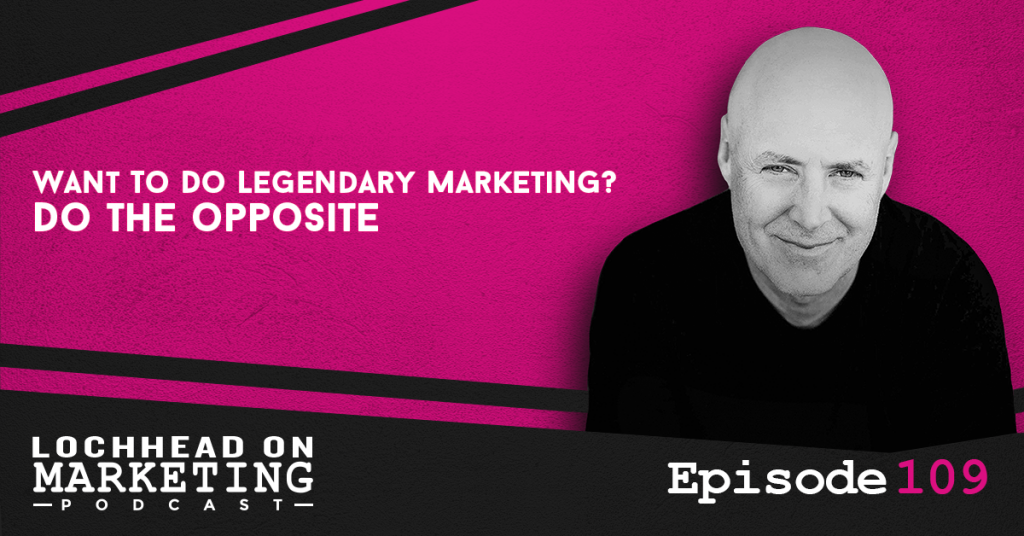
Podcast (lochheadonmarketing): Play in new window | Download (Duration: 10:13 — 7.0MB) | Embed
Subscribe: Apple Podcasts | Spotify | RSS | More
In this episode of Lochhead on Marketing, let’s talk about how to stand out. In many ways, if you want to do legendary marketing, you need to do what the opposite of what most people do.
Doing the Opposite
As part of the mega category people refer to as Creators, there was something that we’ve noticed:
People spend a lot of time telling other people how awesome they are.
When you start looking at creator marketing, what you’ll see is a lot of creators just touting their best achievements and how great they are. Ergo, you should consume the content they create so you can share in his glory, or something.
So what did we do? First of all, we do very little paid advertising. Recently, our friends at Podcast Magazine ran their annual edition that has a directory of all the top podcasts. What we did was buy a full-page ad in it. Though rather than your usual positive reviews and highlights, we ran it featuring negative reviews.
“We ran an ad featuring negative reviews: “Off-putting to some” from The Economist and The Fall. “Annoying host uses profanity needlessly”, and “Very disappointing”. So imagine a photo of myself with those big headlines next to me.” – Christopher Lochhead
Follow Your Different
You might be asking: Why do this?
John Bielenberg talks about how he’s always looking for the dog with the red hat. In other words, he’s looking for ways in order to stand out.
At a time where people are bombarded with information from all sides, people have learned to tune things out. So if they see something that’s pretty much the same as any other information they’ve seen before, they pay less attention to it.
Yet if something different suddenly comes along, say a dog with a red hat, you’d immediately notice it. Because it’s new and it’s not something you see every day.
So I would encourage people to do the opposite of everyone else and stand out amongst the crowd.
“In our case here with this ad, the creator industry is stuffed with what I would call self-congratulatory influencers and hustle porn stars. They are all very busy breaking their arms, patting themselves on the back. So we said, what’s the opposite? Well, the opposite is running an ad with negative reviews in it.” – Christopher Lochhead
Things that Drive Us
If you’re not convinced or still wondering why we did all this, here are seven key things that were driving us… sort of.
- It was Funny
- It’s Different
- It’s Provocative
- This is a first in #podcasting
- Category designers force a choice, not a comparison
- Knowing who is NOT your customer, is more important than know who IS your customer
- I want to empower all creators to say “fuck the haters!”
We share that story with you to encourage you to think in broad and unconventional ways before you’re going to take on any marketing or advertising.
Ask yourself: “what’s the opposite of what everyone else would do here? What’s provocative? What’s funny?” You ask yourself, “what is everybody in our industry doing? What is the exact opposite of that?”
You don’t have to do exactly the opposite. Just map it out and see what others are not doing, and eventually new ideas will probably emerge. As you’re looking for those new ideas, start with what’s the opposite. Do what John Bielenberg suggests, and go find your dog with a red hat.
Bio
Christopher Lochhead is a #1 Apple podcaster and #1 Amazon bestselling co-author of books: Niche Down and Play Bigger.
He has been an advisor to over 50 venture-backed startups; a former three-time Silicon Valley public company CMO and an entrepreneur.
Furthermore, he has been called “one of the best minds in marketing” by The Marketing Journal, a “Human Exclamation Point” by Fast Company, a “quasar” by NBA legend Bill Walton and “off-putting to some” by The Economist.
In addition, he served as a chief marketing officer of software juggernaut Mercury Interactive. Hewlett-Packard acquired the company in 2006, for $4.5 billion.
He also co-founded the marketing consulting firm LOCHHEAD; the founding CMO of Internet consulting firm Scient, and served as head of marketing at the CRM software firm Vantive.
We hope you enjoyed this episode of Lochhead on Marketing™! Christopher loves hearing from his listeners. Feel free to email him, connect on Facebook, Twitter, Instagram, and subscribe on Apple Podcast! You may also subscribe to his newsletter, The Difference, for some amazing content.
108 Advice for 30 Year Old Marketers
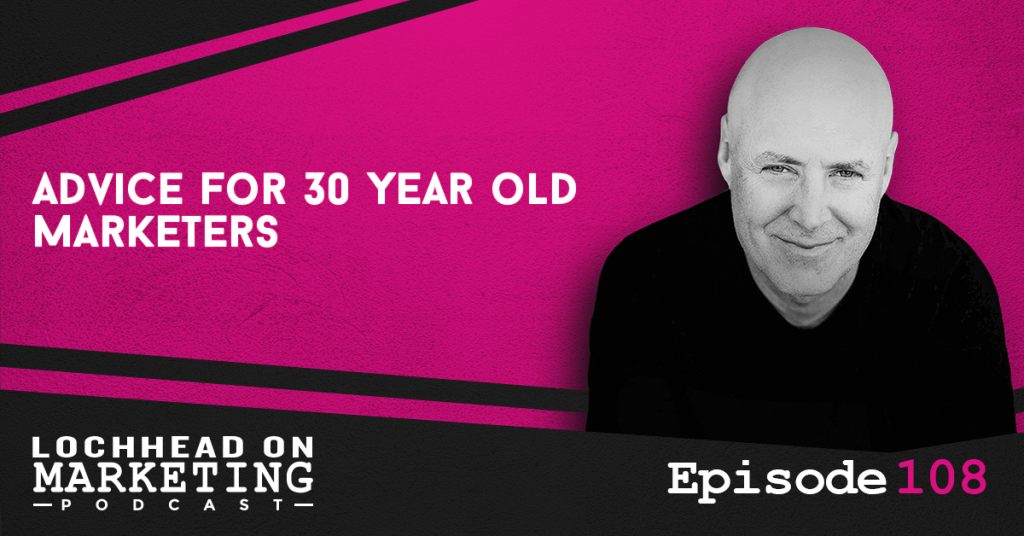
Podcast (lochheadonmarketing): Play in new window | Download (Duration: 7:14 — 5.0MB) | Embed
Subscribe: Apple Podcasts | Spotify | RSS | More
In this episode of Lochhead on Marketing, let us talk about some advice for 30 year old marketers.
I have been asked this question a bunch of times, so I just put together my response as a LinkedIn post. A lot of people though it was a great list, so I thought I’d share it with you.
Making the List
As said earlier, this list was originally a LinkedIn post, and it’s a list of practical advice for 30 year old marketers. There were some who asked if it was in a certain order, and one outright challenged me to do so.
I did not want to do that because I wanted to present them as ideas. Because what might be important for me might not be for others.
Sure enough in the comments, different things on the list resonated with different people.
Though there is an argument to be made about creating lists in certain order, so as to elicit something close to a call to action.
“It seems we live in a world of prescriptions, where people want to do lists and more and more inane sort of business and marketing advice. You know, the seven things Elon Musk does before breakfast. And we’ve gotten to a place where a lot of content about business, about self-help, about marketing is very pablumatic and sort of at a prescription level, do this, do that, etc.” – Christopher Lochhead
While we do create prescription type articles, mostly on what you should and shouldn’t do, that’s not how we work most of the time. Our job is to give people ideas, and with those ideas, they can come up with different combinations or new ways to approach things. We feel that having something close to a to-do list hinders that process.
The Advice for 30 Year Old Marketers
That said, here’s the list of Advice for 30 Year Old Marketers, in no particular order:
- Do legendary work
- Position yourself or be positioned
- You’re not too young to be a CMO, or start a company
- Stop giving a shit about what other people think of you, it’s a trap
- Thinking about thinking is the most important thinking
- Most marketers have been recruited into the cult of the brand
- Categories make brands, not the other way around
- Marketers who create new demand, are most in demand
- They are called category designers
- Nobody legendary is working on their “personal brand”
- The most influential people in the world are not “influencers”
- Only work on legendary teams
- If your company is not going to be a category queen, quit
- Be very careful who’s content you consume
- 90% of what we get taught about marketing is BS
- Learn to write
- Make friends with other Superstar 30 year old’s
- One day, you might rule the world together
- It goes by fast, soak up every second
Bio
Christopher Lochhead is a #1 Apple podcaster and #1 Amazon bestselling co-author of books: Niche Down and Play Bigger.
He has been an advisor to over 50 venture-backed startups; a former three-time Silicon Valley public company CMO and an entrepreneur.
Furthermore, he has been called “one of the best minds in marketing” by The Marketing Journal, a “Human Exclamation Point” by Fast Company, a “quasar” by NBA legend Bill Walton and “off-putting to some” by The Economist.
In addition, he served as a chief marketing officer of software juggernaut Mercury Interactive. Hewlett-Packard acquired the company in 2006, for $4.5 billion.
He also co-founded the marketing consulting firm LOCHHEAD; the founding CMO of Internet consulting firm Scient, and served as head of marketing at the CRM software firm Vantive.
We hope you enjoyed this episode of Lochhead on Marketing™! Christopher loves hearing from his listeners. Feel free to email him, connect on Facebook, Twitter, Instagram, and subscribe on Apple Podcast! You may also subscribe to his newsletter, The Difference, for some amazing content.
107 Did The Roaring 2020s Just Start?: The Economy (Part 2)
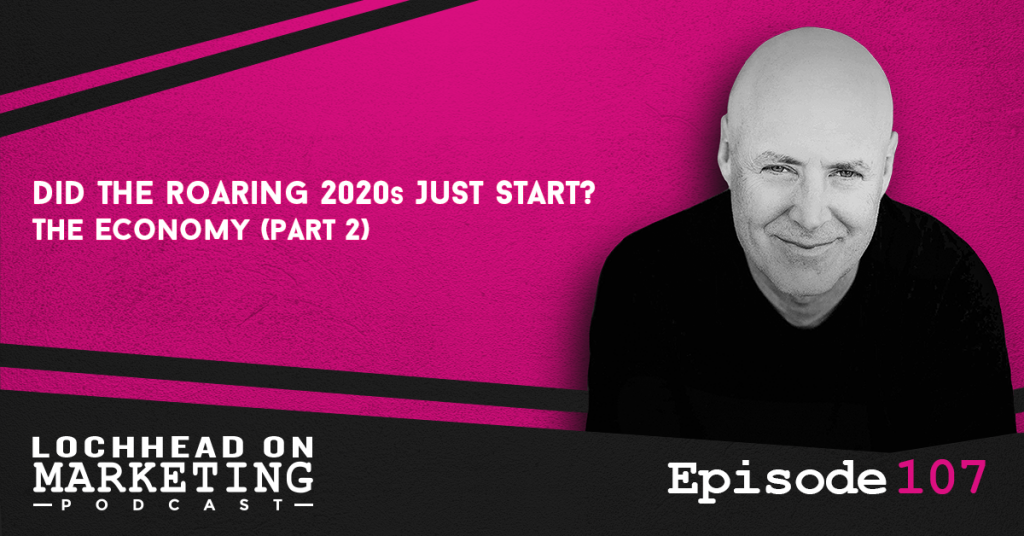
Podcast (lochheadonmarketing): Play in new window | Download (Duration: 21:27 — 14.7MB) | Embed
Subscribe: Apple Podcasts | Spotify | RSS | More
Welcome to the second of a special two-part series here on Lochhead on Marketing called, “Did the Roaring 2020s Just Start?” In this episode, we talk about the Economy.
We believe there is a chance we could be heading into a time of unprecedented economic growth. For a year now, a Categorynado of newness has been gaining momentum. There has never been a higher receptivity to new “stuff”.
Now of course I’m no economist, but I thought it would be powerful to connect some dots on some critical data points in our economy through the category lens.
This two-part series is based on a recent letter published in Category Pirates, my newsletter with co-pirates Eddie Yoon and Nicolas Cole. Go check it out today!
Drawing Parallels
Before we get to the 2020s, let’s talk about the roaring 1920s, and the parallels to what we are experiencing today. At the time it was the end of a pandemic, there was an explosion of new technology, and there was a rocking and raging stock market as well as an explosion of new categories. There were also political and international tensions on proving who was the best that drove development.
Fast forward to today, and we are experiencing the same thing. Only instead of television and vacuum cleaners, our new categories involve AI, Robotics, and information technology.
“That’s what was going on in the 1920s. So for example, electric blenders televisions and vacuum cleaners were categories that took off. Now let’s think about what’s going on in the 2020s. Same thing with the pandemic. Of course, same thing with technology and new categories. Only this time around the new categories are things like AI, video communications, robots, self-learning, robot vacuums, citizen space travel, the electrification of everything and digital Education, telemedicine.” – Christopher Lochhead
Bannister Breakthroughs are Everywhere
We’ve talked about Bannister Breakthroughs in part one of the Roaring 2020s, and how we see it all around us nowadays. Strangely enough, the 1920s also had a lot of Bannister Breakthrough moments. There was an explosion of new categories and ideas brought about by the limitation of the pandemic.
Electricity became widespread to households, new innovations in the automobile industry drove down prices, which brought about various lifestyle and economic impacts. Mail order became a booming category, and companies like Sears. Roebuck and Co. became category kings in this regard.
If you look at how things are today, it is eerily similar yet slightly different at the same time. E-Commerce is booming, and there has been a drive for more efficient electric devices like e-bikes and robo-vacuums. Of course, there’s also Tesla paving the way for developing electronic hybrid cars.
Experts are predicting that another ‘roaring 20s’ is in the making. The Wall Street Journal reported that analysts have increased their economic growth forecast for 2021 to 5.95%
The last time the U.S. economy hit a growth rate anything like that was in 1984.
Looking at the Tailwinds
Let’s take a look at some major tailwinds that we can see on the horizon. First of all, cash. The Wall Street Journal recently reported that, “US companies are sitting on the largest pile of cash ever”.
Furthermore, according to Investor’s Business Daily, “Nine companies in the S&P 500, including Goggle, Apple, and Microsoft, each hold a net cash of 5 Billion apiece or more. Together, these companies hold a total of $325 billion”.
Simply put, there’s a lot of cash in corporations sitting on the sidelines waiting to get deployed.
On the consumer side of things, consumer spending, which accounts for more than two-thirds of U.S. economic activity, jumped 2.4% last month, according to Reuters. The Wall Street Journal reports, “consumer spending has nearly returned to pre COVID-19 levels. The average personal incomes of US households, surpassed pre pandemic levels in September.”
Not to mention all the money being pumped back to the economy via the new Biden Administration’s infrastructure plan.
So what does this all mean?
It means we could be heading into a new golden age of opportunity. As we’ve talked about before, now’s not the time to be focused on the incremental.
“Legendary companies jam the throttle hard coming out recession’s now might be the time to consider investing in innovation in new product development, in marketing, in expansion, and in new category design, and to do that ahead of the curve. Because all the research shows us that the companies who do the best coming out of recessions hit that throttle early in the recovery.” – Christopher Lochhead
To learn more about the Roaring 20s, be it in 1920 or 2020 and its effects on the economy, download and listen to this episode.
Bio
Christopher Lochhead is a #1 Apple podcaster and #1 Amazon bestselling co-author of books: Niche Down and Play Bigger.
He has been an advisor to over 50 venture-backed startups; a former three-time Silicon Valley public company CMO and an entrepreneur.
Furthermore, he has been called “one of the best minds in marketing” by The Marketing Journal, a “Human Exclamation Point” by Fast Company, a “quasar” by NBA legend Bill Walton and “off-putting to some” by The Economist.
In addition, he served as a chief marketing officer of software juggernaut Mercury Interactive. Hewlett-Packard acquired the company in 2006, for $4.5 billion.
He also co-founded the marketing consulting firm LOCHHEAD; the founding CMO of Internet consulting firm Scient, and served as head of marketing at the CRM software firm Vantive. We hope you enjoyed this episode of Lochhead on Marketing™! Christopher loves hearing from his listeners. Feel free to email him, connect on Facebook, Twitter, Instagram, and subscribe on Apple Podcast! You may also subscribe to his newsletter, The Difference, for some amazing content.
106 Did The Roaring 2020s Just Start? Bannister Breakthroughs (Part 1)
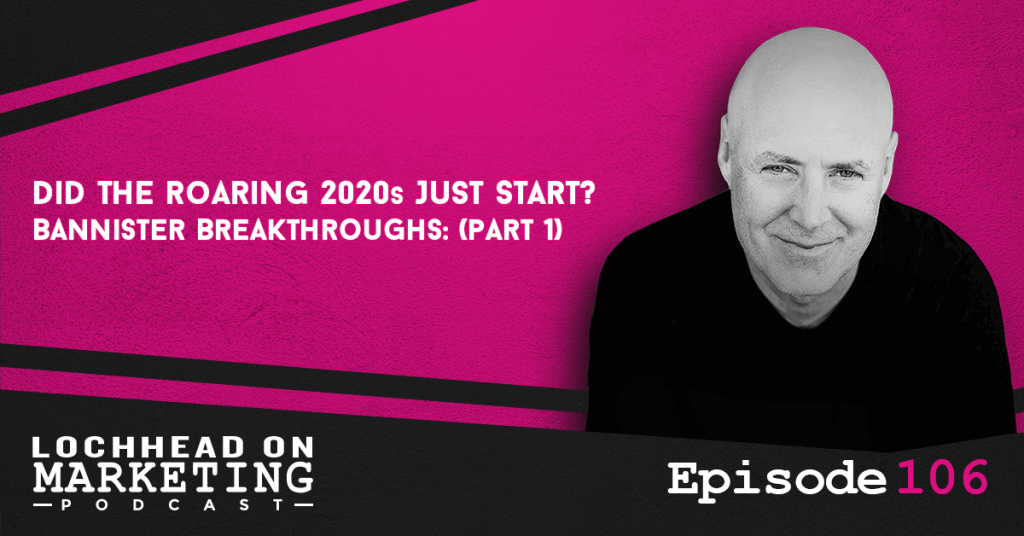
Podcast (lochheadonmarketing): Play in new window | Download (Duration: 13:49 — 9.5MB) | Embed
Subscribe: Apple Podcasts | Spotify | RSS | More
Welcome to a special two-part series on Lochhead on Marketing called, “Did the Roaring 2020s Just Start?” In this episode, we talk about the Bannister Breakthroughs, and how its influence can be seen everywhere today.
We believe there is a chance we could be heading into a time of unprecedented economic growth. We’ll get to the specifics of it in part 2, but for this episode, let’s talk about how category breakthroughs can lead to even more category breakthroughs. If we play our cards right, we might be living at the greatest time for new innovation in history!
This two-part series is based on a recent letter published in Category Pirates, my newsletter with the legendary co-pirates Eddie Yoon and Nicolas Cole.
Breaking Through the Limits
On May 6th 1954, a young British land named Roger Bannister broke the four-minute mile. Before the feat was achieved, this was deemed impossible or only doable under the right circumstances. Yet Bannister broke records and expectations by doing it his way.
The Harvard Business Review published a terrific summary of the story:
“The four-minute barrier stood for decades — and when it fell, the circumstances defied the confident predictions of the best minds in the sport. Experts believed they knew the precise conditions under which the mark would fall. It would have to be in perfect weather — 68 degrees and no wind. On a particular kind of track — hard, dry clay, and in front of a huge, boisterous crowd urging the runner on to his best-ever performance. But Bannister did it on a cold day, on a wet track, at a small meet in Oxford, England, before a crowd of just a few thousand people.”
Roger Bannister’s achievement served as the breakthrough that led to more breakthroughs in the world of competitive running. Only 46 days later, the “impossible” record was broken again. A year after that, three runners broke the four-minute mile in a single race.
Much like Bannister, legendary innovators and category designers make the impossible possible. While it may seem mundane now — like Bannister’s four-minute breakthrough, it still serves as a catalyst for others to believe that something impossible could be done. It makes people receptive to the idea that there is a possibility that they can explore which leads to a different future.
Creating a Before and After
The results of a Bannister Breakthrough or creating a revolutionary category always creates a before and after. People who bear witness to both sides are changed as a result. They either embrace it, or find new ways and breakthroughs themselves.
“Category designers, innovators, entrepreneurs, that’s what they do. They create a before and after they change reality, they make new possibilities into new realities.” – Christopher Lochhead
Category designers create a before and after they change reality, they make new possibilities into new realities.
In Rogers’ case, he smashed an imaginary what seemed like an immovable milestone. His breakthrough, like all legendary breakthroughs, opened up others to ask, “What else is possible?”
Bannister Breakthroughs Everywhere
Fast forward to today, where you can see Bannister breakthroughs happening everywhere. With information at our fingertips, you’ll see people come up with new categories to solve things others didn’t know they even needed up until today.
For a more relatable example, having a large-scale remote workforce wasn’t deemed possible before. It was always a means for emergency access to work for some, and usually only available for managerial roles. Yet within the span of a year, we’ve seen businesses thrive in full-remote or hybrid setups worldwide.
As these breakthroughs continue to happen, just like back in Roger’s days, there are three categories of people:
“There are the people who make the change. There are the people who sit there and go, “oh look, something just changed”. And there are people who say, “What the fuck, did something happen?” – Christopher Lochhead
At this unique moment in history where almost everything about the way we work, live and play is at least potentially up for change, the question we all have to ask ourselves is what kind of person am I?
Bio
Christopher Lochhead is a #1 Apple podcaster and #1 Amazon bestselling co-author of books: Niche Down and Play Bigger.
He has been an advisor to over 50 venture-backed startups; a former three-time Silicon Valley public company CMO and an entrepreneur.
Furthermore, he has been called “one of the best minds in marketing” by The Marketing Journal, a “Human Exclamation Point” by Fast Company, a “quasar” by NBA legend Bill Walton and “off-putting to some” by The Economist.
In addition, he served as a chief marketing officer of software juggernaut Mercury Interactive. Hewlett-Packard acquired the company in 2006, for $4.5 billion.
He also co-founded the marketing consulting firm LOCHHEAD; the founding CMO of Internet consulting firm Scient, and served as head of marketing at the CRM software firm Vantive. We hope you enjoyed this episode of Lochhead on Marketing™! Christopher loves hearing from his listeners. Feel free to email him, connect on Facebook, Twitter, Instagram, and subscribe on Apple Podcast! You may also subscribe to his newsletter, The Difference, for some amazing content.
105 Value is 100% Perception
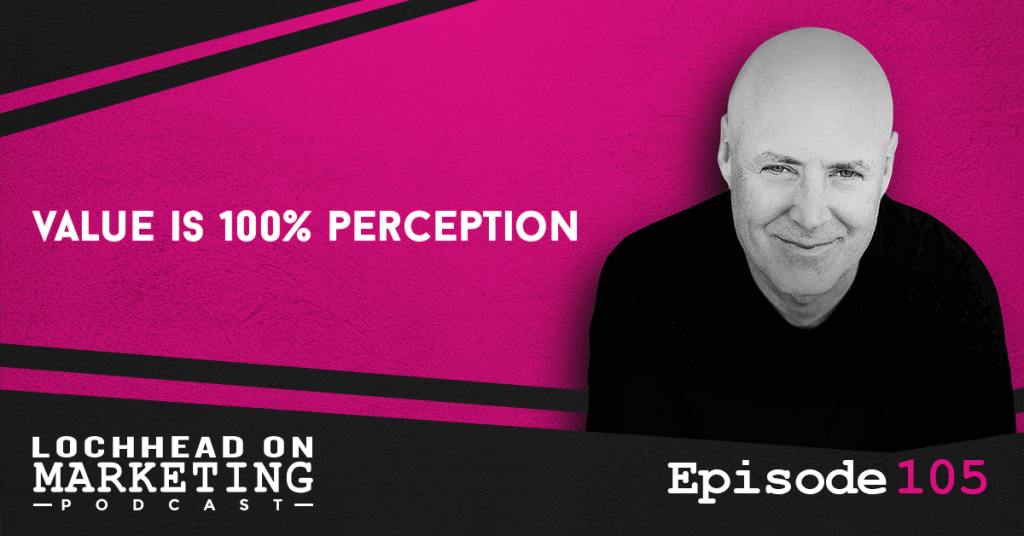
Podcast (lochheadonmarketing): Play in new window | Download (Duration: 8:12 — 5.6MB) | Embed
Subscribe: Apple Podcasts | Spotify | RSS | More
In this episode, Christopher Lochhead talks about value, and how it is 100% dependent on people’s perception. That is to say, nothing has any intrinsic value until someone believes it has value.
You can also learn about one of the greatest stories about how an entrepreneur and category designer created value, that is to say, the perception of value for a product that left a lot of people scratching their heads.
Gary’s Pet Rock
Gary Dahl and his pet rock is an amazing study on how people assign value to something based on their perception.
In 1975, Gary Dahl thought it would be funny to sell pet rocks. He never would’ve thought that this funny running gag would sweep the nation, selling roughly 1.5 million pet rocks at $3.95 a pop.
Christopher remembers his sister wanting to join in the fad, so he offered to catch her a pet rock himself.
“I remember this well. I was a kid at the time and my sister wanted one, and I remember exactly what I said at the time: “Well, if you like, I’ll go outside and catch you a wild one.” “- Christopher Lochhead
Was it a weird fad? Probably. Yet it wasn’t the first of its kind, and certainly not the last crazy fad people subscribed to.
Value is in the Perception
While it may seem silly that Gary Dahl managed to sell that many pet rocks, but how he marketed it was nothing short of genius.
He packaged it in a colorful box that even had holes so your pet rock can “breathe”. There was even a comprehensive manual on how you can take care of your pet rock, which just adds to the hilarity of it all.
Basically, Gary Dahl assigned a value to his pet rocks. As a Category Designer and some brilliant marketing, he made people perceive the Pet Rock as something of value. All due to the story he weaved to back it up.
So what does this teach us? For Christopher it means that nothing is intrinsically valuable. That value is 100 percent a perception.
“If you’re a regular listener, you’ve heard me and you’ve heard Jason talking about these new NFTs in the digital space: people selling digital products at extraordinary prices. Jason made the comment that his dad is in the art business and he grew up in that business. In his words, what sells a painting is a story. And so what makes something valuable is that people perceive it as valuable.” – Christopher Lochhead
Creating Value Out of Nothing
Legendary category designers are legendary because they create new perceptions of value. They establish the belief that something is valuable when that belief did not exist before.
So as category designers, the challenge is to change people’s perception about your product or services. If you are successful, you can create something valuable… out of nothing.
Bio
Christopher Lochhead is a #1 Apple podcaster and #1 Amazon bestselling co-author of books: Niche Down and Play Bigger.
He has been an advisor to over 50 venture-backed startups; a former three-time Silicon Valley public company CMO and an entrepreneur.
Furthermore, he has been called “one of the best minds in marketing” by The Marketing Journal, a “Human Exclamation Point” by Fast Company, a “quasar” by NBA legend Bill Walton and “off-putting to some” by The Economist.
In addition, he served as a chief marketing officer of software juggernaut Mercury Interactive. Hewlett-Packard acquired the company in 2006, for $4.5 billion.
He also co-founded the marketing consulting firm LOCHHEAD; the founding CMO of Internet consulting firm Scient, and served as head of marketing at the CRM software firm Vantive.We hope you enjoyed this episode of Lochhead on Marketing™! Christopher loves hearing from his listeners. Feel free to email him, connect on Facebook, Twitter, Instagram, and subscribe on Apple Podcast! You may also subscribe to his newsletter, The Difference, for some amazing content.

